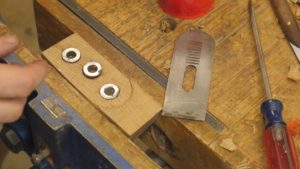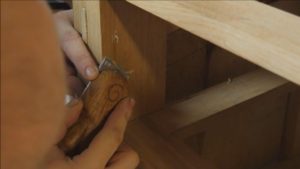Make a Flat Chisel Plane
Much like the last chisel plane I made, https://youtu.be/GUcn2W3UwtI this is another way to make a chisel plane and in many ways a much easier method to make one. Here the iron itself is the sole and the cutting angle is only 25 degrees. It ends up acting a lot more like a chisel and is far easier to work with.
Tools used
V-tool: http://amzn.to/2iNSdEn
Carving Mallet: http://amzn.to/2iT4FoO
Router Plane: http://amzn.to/2j8GeEa
Panel saw: http://amzn.to/2hjAura
Marking knife: http://amzn.to/2hPHf34
Brace: http://amzn.to/2hPEs9Y
Bit set: http://amzn.to/2hZVT5T
Chisel Set: http://amzn.to/2i26mzX
#4 Hand plane setup for smoothing: http://amzn.to/2hc6LQZ
File Set: http://amzn.to/2iGrcWq
Sharpening stones: http://amzn.to/2iTfjfe
I use Extra course, Medium-fine, and Extra-Extra fine.
Supplies
Block Plane Iron: http://amzn.to/2i3yBgY or get one from a garage sale or second-hand store.
White Oak Fire Wood: the firewood pile outback or on free Craigslist
Magnets: http://amzn.to/2j8gOq2
Boiled Linseed Oil: http://amzn.to/2hPEUVO
Paste Wax: http://amzn.to/2inlN23
5-minute epoxy: http://amzn.to/2io6ppa
Wax Paper: http://amzn.to/2jAaxAc
Find An Iron
For the iron, I find it easiest to just buy a cheap old block plane at a garage sale or second-hand store, usually for $2-$3. You can also get replacement blades online (http://amzn.to/2i3yBgY). That might be just as cheap but you never know what you get till it is in hand. If you buy it second hand it might need some cleanup, but usually, that means 5 minutes with some sandpaper to clean the rust off.
Dimension A Block of Wood
You will want to find a block of wood to match your iron. It should be about 1 1/2" high, the width of your iron (in my case 1 1/2"), and about 1" longer than your iron (in my case 5" long). Next, lay the iron on the bottom so the tip sticks out the front about 1/4" then trace the back and use a marking knife to create a stop cut on that line.
Clean Out Waste
With a router plane remove the material between the line you drew and the front down to the depth of the iron thickness. I left some material up at the front so the plane could reference off of that. I used the router plane to remove all the waste between the line and the last 1/2" of the tip. Next, I came in with a chisel and removed that last 1/2" on the tip referencing the flat surface just made with the hand router.
Drill Holes for Magnets
Next. drill out holes for the 3 magnets. In my case, that was 3/4" diameter and 1/8" deep. You want to make sure the magnet is flush with or just slightly under the wood sole.
Attach Magnets
If your magnets have a countersunk hole then you could just screw them down, but in my case, I opted for 5-minute epoxy. After applying the epoxy to the hole and inserting the magnet, I laid down a layer of wax paper then set the iron down on the paper to hold the magnets in the correct location while the epoxy cured.
Flatten The Iron
Now that the iron has a bed to sit on, it needs to be flattened. This could not be done before as the iron will conform to the wood bed and magnets. I used an extra course diamond plate. Keep the iron attached to the body and keep going till you have even scratches on the sole of the iron from end to end. Once it is flat, continue on the Medium-fine and Extra-extra Fine stones fo give the sole a nice polish.
Sharpen the Iron
While you have the iron at the sharpening stone, take it out of the body and sharpen the bevel. I go through all three stones. I also use a honing guide to set the bevel at 25 degrees the first time.
Shape the Body
Use a series of chisels, rasps, and files to shape the body in any way you would like. The shape really does not matter as long as it feels good in your hand.
Carving
I like to make the tool my own with a bit of carving. I just draw a simple spiral on the top and follow it with a V-Tool. This is really simple and takes only moments to do but it adds so much to the piece in the end.
Finish and Assemble
For a finish, I use boiled linseed oil and paste wax. I love the way it feels in the hand and it goes on easily. Assembly is also easy as it just snaps into place with the magnets there is no adjustment needed. Now it is ready to use to remove glue and get into small corners. It is not a tool that is used all that often but when it is, it is the tool you want!



















